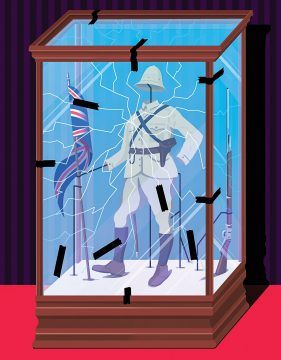Maya Jasanoff in The New Yorker:
 On a cloud-spackled Sunday last June, protesters in Bristol, England, gathered at a statue of Edward Colston, a seventeenth-century slave trader on whose watch more than eighty thousand Africans were trafficked across the Atlantic. “Pull it down!” the crowd chanted, as people yanked on a rope around the statue’s neck. A few tugs, and the figure clanged off its pedestal. A panel of its coat skirt cracked off to expose a hollow buttock as the demonstrators rolled the statue toward the harbor, a few hundred yards away, and then tipped it headlong into the water.
On a cloud-spackled Sunday last June, protesters in Bristol, England, gathered at a statue of Edward Colston, a seventeenth-century slave trader on whose watch more than eighty thousand Africans were trafficked across the Atlantic. “Pull it down!” the crowd chanted, as people yanked on a rope around the statue’s neck. A few tugs, and the figure clanged off its pedestal. A panel of its coat skirt cracked off to expose a hollow buttock as the demonstrators rolled the statue toward the harbor, a few hundred yards away, and then tipped it headlong into the water.
The Black Lives Matter movement has accelerated a reckoning across Europe about the legacies of slavery and imperialism, nowhere more urgently than in Britain, which presided over the largest empire in world history. The Colston statue stood on Colston Avenue, in the shadow of Colston Tower, on Colston Street, around the corner from Colston Hall. Scratch almost any institution with roots in Britain’s era of global dominance and you’ll draw imperial blood—from the Rhodes Trust, established by the fervent expansionist and white supremacist Cecil Rhodes, to the British Museum, whose founding collection was funded by profits from Jamaican plantations worked by slaves, and the Booker Prize, launched by a food company once notorious for its exploitative practices in the cane fields of British Guiana. Every year, the Queen honors hundreds of citizens with the Order of the British Empire. (A 2004 parliamentary committee recommended changing the name to the Order of British Excellence, to no avail.)
Public discussion in Britain about the imperial past has pivoted on a reductive question: Was the empire good or bad? The Labour Party has pledged to “ensure the historical injustices of colonialism, and the role of the British Empire” are “properly integrated into the National Curriculum,” while Boris Johnson, the Prime Minister, decries a “cringing embarrassment about our history.” A March, 2020, poll found that a third of Britons believed that their empire had done more good than harm for colonies—a higher percentage than in other former imperial powers, including France and Japan. More than a quarter of Britons want the empire back.
Asking, today, whether empire was good or bad is, as a historical matter, about as useful as asking whether the Atlantic Ocean is good or bad.
More here.
